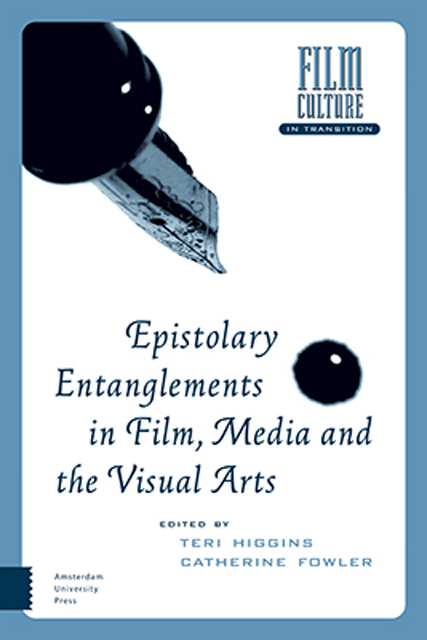Book contents
- Frontmatter
- Table of Contents
- Acknowledgements
- Doing (Audio-Visual) Things with Words – From Epistolary Intent to Epistolary Entanglements: An Introduction
- 1 Performance and Power : The Letter as an Expression of Masculinity in Game of Thrones
- 2 ‘My dearest little girl, I just got your letter and I hope that you will continue to write to me often’: Epistolary Listening in News from Home (Chantal Akerman, 1976)
- 3 Dead Letters: Epistolary Hauntology and the Speed of Light in Personal Shopper (Olivier Assayas, 2016)
- 4 Attention to Detail: Epistolary Forms in New Melodrama
- 5 The Spiritual Intimacies of The Red Hand Files: How Long Will I Be Alone?
- 6 Video Authenticity and Epistolary Self-Expression in Letter to America (Kira Muratova, 1999)
- 7 Epistolary Affect and Romance Scams: Letter from an Unknown Woman
- 8 Delivering Posthumous Messages : Katherine Mansfield and Letters in the Literary Biopic Leave All Fair (John Reid, 1985)
- 9 The Interactive Letter : Co-Authorship and Interactive Media in Emily Short’s First Draft of the Revolution
- 10 Epistolary Distance and Reciprocity in José Luis Guerín and Jonas Mekas’s Filmed Correspondences
- 11 Instagram and the Diary : The Case of Amalia Ulman’s Excellences & Perfections (2014)
- 12 Civil War Epistolary and the Hollywood War Film
- 13 Epistolarity and Decolonial Aesthetics in Carola Grahn’s Look Who’s Talking (2016)
- 14 Epistolary Relays in Fatih Akin’s Auf der anderen Seite (On the Other Side/On the Edge of Heaven) (2007)
- Index
11 - Instagram and the Diary : The Case of Amalia Ulman’s Excellences & Perfections (2014)
Published online by Cambridge University Press: 20 June 2023
- Frontmatter
- Table of Contents
- Acknowledgements
- Doing (Audio-Visual) Things with Words – From Epistolary Intent to Epistolary Entanglements: An Introduction
- 1 Performance and Power : The Letter as an Expression of Masculinity in Game of Thrones
- 2 ‘My dearest little girl, I just got your letter and I hope that you will continue to write to me often’: Epistolary Listening in News from Home (Chantal Akerman, 1976)
- 3 Dead Letters: Epistolary Hauntology and the Speed of Light in Personal Shopper (Olivier Assayas, 2016)
- 4 Attention to Detail: Epistolary Forms in New Melodrama
- 5 The Spiritual Intimacies of The Red Hand Files: How Long Will I Be Alone?
- 6 Video Authenticity and Epistolary Self-Expression in Letter to America (Kira Muratova, 1999)
- 7 Epistolary Affect and Romance Scams: Letter from an Unknown Woman
- 8 Delivering Posthumous Messages : Katherine Mansfield and Letters in the Literary Biopic Leave All Fair (John Reid, 1985)
- 9 The Interactive Letter : Co-Authorship and Interactive Media in Emily Short’s First Draft of the Revolution
- 10 Epistolary Distance and Reciprocity in José Luis Guerín and Jonas Mekas’s Filmed Correspondences
- 11 Instagram and the Diary : The Case of Amalia Ulman’s Excellences & Perfections (2014)
- 12 Civil War Epistolary and the Hollywood War Film
- 13 Epistolarity and Decolonial Aesthetics in Carola Grahn’s Look Who’s Talking (2016)
- 14 Epistolary Relays in Fatih Akin’s Auf der anderen Seite (On the Other Side/On the Edge of Heaven) (2007)
- Index
Summary
Abstract
Amalia Ulman's Instagram performance Excellences & Perfections (2014) was hailed as the first Instagram masterpiece. Unusually for an artwork, it begins in a clandestine fashion on 20 April 2014. The performance was discreetly but enigmatically introduced into Ulman's existing Instagram feed. When Ulman was interviewed in 2015 following the revelation of her fictional production, it was in the context of a well-established literary genre – the diary. To use the epistolary form of the diary to discuss Ulman's work instantly gets to the heart of the project – the unreliable narrator and suspect self-presentation. Ulman has said that she wanted to underscore the idea of the unreliable self-reporting of social media. This chapter analyses Excellences & Perfections in this light.
Keywords: Instagram art; digital art; life narratives; masquerade; diary
According to literary scholar Kylie Cardell the contemporary diary can take a variety of forms: ‘a performative space, a print genre, a digital platform, a behavior regime, a smartphone app’. Traditionally, as Cardell reports, the diary is viewed as a fundamentally private and intimate mode of selfdocumentation and self-examination. Think here of old fashioned daily or nightly ‘Dear Diary’ regimes which provided a space to divulge (and commit to paper) one's innermost dreams, desires, thoughts, and feelings. When such diaristic activity is presented on a digital platform, the confidant invoked by ‘Dear Diary’ is replaced by the fickle and unreliable ‘Dear Public’ or ‘Dear World’ as the title of Cardell's book puts it.
On the typical online blog, the entries (daily or otherwise) that would normally constitute the substance of a personal diary are presented to readers in real time and are often subject to interaction from others; approbation or criticism can be expressed through the comments function. Alongside these kinds of text-based online life writings, increasingly images are being used as a means to chronicle the occurrences and concerns of daily life; photographs are as much ‘a trace of a moment’, as Phillipe Lejeune puts it, as a written diary note. Indeed Cardell cites James E. Young's contention that diaries are like photographs insofar as they are ‘remnants of their objects’ that have the authority of reality. This chapter considers what kinds of diaristic self-reporting and self-reflection are facilitated by the image-sharing digital platform Instagram.
- Type
- Chapter
- Information
- Epistolary Entanglements in Film, Media and the Visual Arts , pp. 207 - 224Publisher: Amsterdam University PressPrint publication year: 2023



